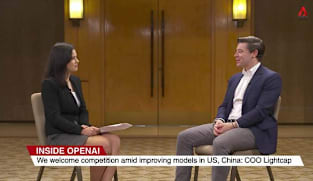Indranee Rajah on motion calling for impartial Speaker and Parliament as a fair arena for all
Having someone who is non-partisan and not a member of a political party would not guarantee the results wanted, said Leader of the House Indranee Rajah. Speaking in Parliament on Wednesday (Aug 2), she cited the UK as an example, with individuals resigning from their political parties upon being appointed as Speakers. This did not prevent one of their former Speakers from being put into a position where he was accused of bias and faced complaints of bullying, she said. She also pointed out that the Speaker is someone who can receive the support of the majority of the House - which would often be someone from the majority party. This arrangement reflects the reality that the person has to receive a majority of the votes in Parliament to be appointed Speaker. And it is quite natural for a candidate from the majority party to be in a position to receive the majority of votes, she said. Ms Indranee pointed out that the majority party would have derived its majority from voters. "So, you have to bear in mind that the mandate of the majority party is drawn directly from the people. And the person put up for election as the Speaker, if he or she has the confidence of the majority, then he or she gets appointed as the Speaker,” she said. Ms Indranee also said Progress Singapore Party’s proposal to require a Speaker to be independent, in the sense of not being a member of a political party or not being an MP, is actually not in accordance with, and is much more limiting than the constitutional requirements. “At the end of the day, it boils down to how the individual holding the office of Speaker conducts himself or herself, and it is very important that the Speaker is mindful of the duties and obligations that come with the office,” she said. Ms Indranee also said it is incumbent upon MPs to not disregard the authority of the Chair and to be familiar with the Standing Orders. “So, it works both ways for Parliament to function effectively, properly and importantly, to gain the respect of people. The Speaker has to do his job, but equally, all MPs and ministers have to do their jobs.”
Having someone who is non-partisan and not a member of a political party would not guarantee the results wanted, said Leader of the House Indranee Rajah. Speaking in Parliament on Wednesday (Aug 2), she cited the UK as an example, with individuals resigning from their political parties upon being appointed as Speakers. This did not prevent one of their former Speakers from being put into a position where he was accused of bias and faced complaints of bullying, she said. She also pointed out that the Speaker is someone who can receive the support of the majority of the House - which would often be someone from the majority party. This arrangement reflects the reality that the person has to receive a majority of the votes in Parliament to be appointed Speaker. And it is quite natural for a candidate from the majority party to be in a position to receive the majority of votes, she said. Ms Indranee pointed out that the majority party would have derived its majority from voters. "So, you have to bear in mind that the mandate of the majority party is drawn directly from the people. And the person put up for election as the Speaker, if he or she has the confidence of the majority, then he or she gets appointed as the Speaker,” she said. Ms Indranee also said Progress Singapore Party’s proposal to require a Speaker to be independent, in the sense of not being a member of a political party or not being an MP, is actually not in accordance with, and is much more limiting than the constitutional requirements. “At the end of the day, it boils down to how the individual holding the office of Speaker conducts himself or herself, and it is very important that the Speaker is mindful of the duties and obligations that come with the office,” she said. Ms Indranee also said it is incumbent upon MPs to not disregard the authority of the Chair and to be familiar with the Standing Orders. “So, it works both ways for Parliament to function effectively, properly and importantly, to gain the respect of people. The Speaker has to do his job, but equally, all MPs and ministers have to do their jobs.”



















